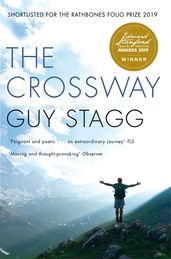Synopsis
Winner - Edward Stanford Travel Memoir of the Year 2019.
Shortlisted - Rathbones Folio Prize, RSL Ondaatje Prize, and Somerset Maugham Award 2019.
In 2013 Guy Stagg made a pilgrimage from Canterbury to Jerusalem. Though a non-believer, he began the journey after suffering several years of mental illness, hoping the ritual would heal him. For ten months he hiked alone on ancient paths, crossing ten countries and more than 5,500 kilometres. The Crossway is an account of this extraordinary adventure.
Having left home on New Year’s Day, Stagg climbed over the Alps in midwinter, spent Easter in Rome with a new pope, joined mass protests in Istanbul and survived a terrorist attack in Lebanon. Travelling without support, he had to rely each night on the generosity of strangers, staying with monks and nuns, priests and families. As a result, he gained a unique insight into the lives of contemporary believers and learnt the fascinating stories of the soldiers and saints, missionaries and martyrs who had followed these paths before him.
The Crossway is a book full of wonders, mixing travel and memoir, history and current affairs. At once intimate and epic, it charts the author’s struggle to walk towards recovery, and asks whether religion can still have meaning for those without faith.
A BBC Radio 4 'Book of the Week' in 2018.
Details
Reviews
The Crossway is in many ways classic travelogue, so classic indeed that early admirers have drawn parallels with Patrick Leigh Fermor. Stagg certainly has a way with words . . . But in addition – and unlike the rather stiff-upper-lipped Leigh Fermor – Stagg allows an emotional honesty to filter through the golden prose . . . a luminous and occasionally (almost in spite of itself) numinous account . . . moving and thought-provoking
Having finished this account, I felt dazed. Dazed at the thought of all that I’d learnt from its pages about 2,000 years of Christianity, dazed at how immediate its author had made so many centuries-old stories feel, and dazed at the strangeness and brilliance of this extraordinary travelogue.
The journey as redemptive recovery is a well-worm trope, but there is no glib ending here. I really enjoyed this book.
Such pitch-perfect prose that he has already attracted comparisons with Patrick Leigh Fermor’s celebrated accounts of his youthful travels
